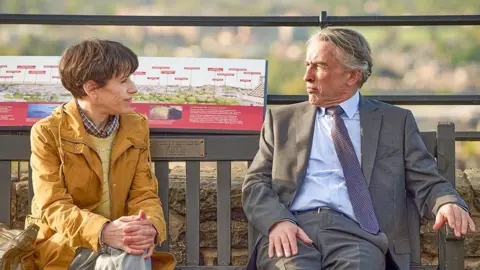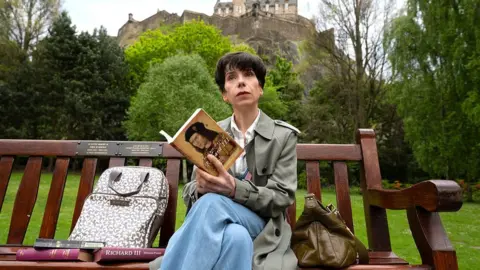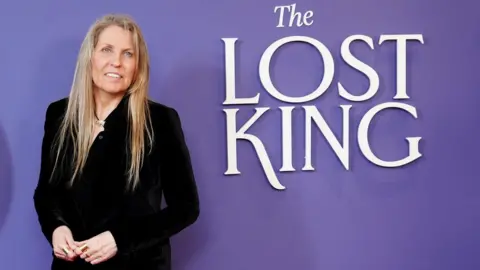The Lost King: Steve Coogan defends Richard III film in university row
 Tiff
TiffSteve Coogan has defended a new film about the discovery of Richard III's skeleton, in a row over how it portrays some University of Leicester academics.
The Lost King tells the story of Philippa Langley, whose research led to the discovery of the king's remains under a car park in the city in 2012.
The university said claims that its staff sidelined her and took the credit are "far removed" from the truth.
But Coogan said: "The university are responsible for their own undoing."
The actor told BBC Radio 4's Today programme: "They've played this quite badly.
"Had they at the start been generous towards Philippa, and elevated her to the front and centre position, which is where she deserves to be, this film wouldn't have been necessary.
"But at every turn they marginalised her, edged her out, because she wasn't cut from the right cloth."
 Tiff
TiffMrs Langley, played by Sally Hawkins, is presented as being instrumental in the discovery of the skeleton; the driving force behind identifying the burial site and securing funding for the dig.
But several academics and university staff are shown to be dismissive of and patronising towards her, before attempting to claim the credit when her research is found to be correct.
'Utterly false'
Richard Taylor, former deputy registrar at Leicester University, told the BBC: "I think the film is inaccurate, and I think the writers have been very reckless in how they've put it together.
"They've not sought at any point to speak to me, nor did they take up the University of Leicester's offer to engage on the fact checking side of it. As a consequence, the film is littered with inaccuracies.
"It makes up a scene where I mimic Richard III's disability, and have to be told by Philippa not to equate physical characteristics with evilness. That is the most hurtful personally and the most damaging reputationally. It is not true, it did not take place."
Mr Taylor is reportedly so upset by his portrayal that he has threatened to take legal action to get one scene cut and a note added to the credits that the character is not based on him.
 Reuters
ReutersWhile several university staff members are portrayed in the film as not altogether bad people, they often speak patronisingly towards Langley, or are seen trying to put themselves at the centre of media coverage.
Another real-life figure, Dr Richard Buckley, is presented as being dismissive of Mrs Langley, only agreeing to become involved when his department is threatened with closure and he faces losing his job.
However, Dr Buckley told the Daily Mail: "There is no truth to our department being under threat of closure or my job being on the line or anything like that. That was just nonsense."
He added: "The film is billed as being the true story when clearly a lot of it just isn't true."
The paper said it had seen correspondence from the time between Mrs Langley and Mr Buckley, which is "full of ideas, suggestions, co-operation and positivity".
Mr Taylor told the BBC: "All the changes in the film… are designed to create an artificial narrative of a sexist, male-dominated university seeking to betray this lone female heroine. And the only way the film-makers have been able to do that is by artificially removing all the key female academic leads from the story."
 PA Media
PA MediaCoogan, who co-wrote the film and plays Mrs Langley's husband, told the Today programme he had been "incensed" by how she had been treated, and that there had been a "central inaccuracy" in the media reporting at the time.
"The search for Richard III was not led by Leicester University," he said.
Asked whether the film portrayed university staff as "patronising glory hunters", co-writer Jeff Pope replied: "Well, I think it's slightly overstated, but I think there is something in those... words.
"I think, yes... What happened was, Philippa led the search for the king. She paid for the dig. She hired the University of Leicester archaeologists to dig.
"There's no doubt that once the remains had been found, the university academics performed the DNA analysis. But they then used that to leverage credit for the whole thing, and that's the problem. That's what the film seeks to address."
In a recent interview with the Guardian, Mrs Langley said she had felt "sidelined and marginalised".
"I was hugely vulnerable because I'm not a doctor, I'm not a professor. But in the end, I came to find my voice," she said.
A spokesperson for the university said: "We do feel the portrayal of the University of Leicester's role in the project is far removed from the accurate work that took place.
"We worked closely with Philippa Langley throughout the project, and she was not sidelined by the university. Indeed, she formed part of the team interview panel for every single press conference connected to the king."
